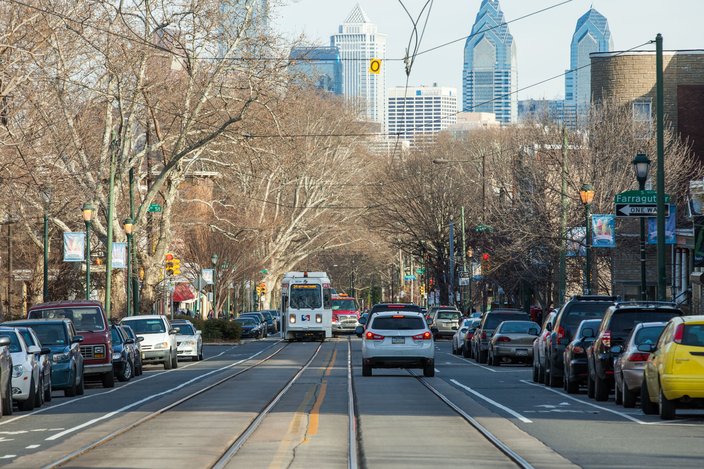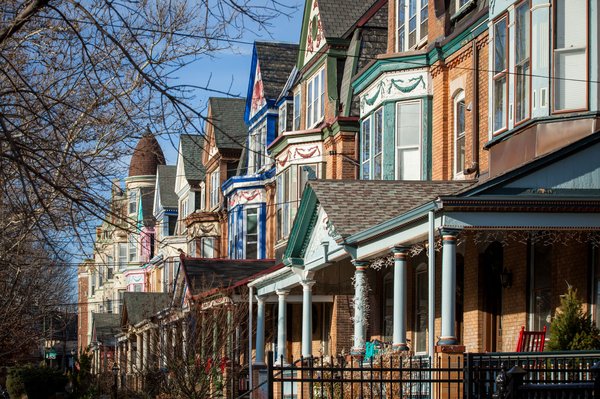Why do I think West
Philly is Philadelphia’s best neighborhood? I could use these paragraphs only to
rhapsodize about the whiskey selection at Fiume or the Caribbean chow at Little
Delicious (in Kingsessing) or our roster of music icons, but that tact would be false. The tourist’s short list isn’t the sum of
what my neighborhood means to me. What
does the superlative “best” mean anyway? Nobody’s the best at everything. South
Philly has us beat on Asian food. Chestnut Hill has better parks. It’s
not a matter of wins and losses. West
Philly is more than the sum of its parts.
The more time I spend thinking of ways to compliment my neighborhood, the more I realize I’m in love with it, warts and all. I love West Philly because I love West Philly kind of folks. When I come back from a long tour, or when I walk down the avenue on a brisk spring day, I feel a certain buoyancy. I am where I’m supposed to be. I’m home. So instead of just trotting out a screed of touristic neighborhood boosterism, I’m going to give you a paean to my West Philly – maybe you can come to love it, too.

This task is complicated by the fact that I’m not sure exactly how to delineate my part of the neighborhood. West and Southwest Philly are made up of dozens of micro-hoods and about 300,000 people. The sphere of my daily life spreads farther than Cedar Park, my neighborhood of residence. I can’t call that sphere West or Southwest Philly as a whole. I hang out in Garden Court. I garden in Woodland Terrace. I shop for groceries in Parkside. I hike in Eastwick. I play ball in Kingsessing. But for a lack of a better term, West Philly is the shorthand.
That said, I certainly can’t rep “University City.” The age-old graffiti campaign tells me, “This is West Philly. University City is a marketing scheme.” I can’t disagree with that. The university area is an entity unto itself, ballooning with money and prestige. The universities are a major part of what goes on in the neighborhood. However, they are a two-faced presence. It’s complicated.
“University City” and West Philly have become conflated in many ways. Recently, my PhillyVoice colleague Aubrey Nagle satirically sent-up “University City” as a millennial futurama in which “the campuses that dominate the area live in harmony with the surrounding communities. With their civic engagement programs and volunteer opportunities, USP, Drexel and UPenn work tirelessly to create one big West Philly love fest.” While the universities do some good, but they are self-interested forces. Just because gastropubs and high-rises sprout from the ashes of dive bars and tenements doesn’t mean the place is turning into a candyland. Neighborhoods are about people, not things amidst which they live.
West Philly is a big small town. Walk down the street and you’re sure to bump into an old friend. As much as it is a place, it is a community.
I worry that traces of a neighborhood that are no less vibrant or valid than “University City” have been irrevocably erased from some minds. Not all that glitters is gold - it was in pre-gastropub West Philly that Schoolly D and DJ Code Money invented gangster rap in the 1980s. DJ Jazzy Jeff, David Brenner, Patti LaBelle and Ed Bacon thought big here before “University City” was a concept. Don’t neglect the tree’s roots despite the beauty of its flowers.
Let me tell you what makes West Philly really great – and it’s not a Shake Shack.
West Philly is a big small town. Walk down the street and you’re sure to bump into an old friend. As much as it is a place, it is a community. People drop off holiday cookies on my porch. Neighbors are always happy to help with odd jobs and handyman tasks. My wife prunes the trees on the block. My neighbor shovels the snow in the church parking lot across the street. We look out for each other.
We mingle together. Ethiopian bars swell with patrons of all races, vibing to rap, dancehall or country western on the jukebox. Muslims, Jews and gentiles eat falafel together at 45th and Walnut. Hard-scrabble Thai immigrants and patch-attired punk rockers shop for veggies out of the back of produce trucks. It may be a poor man’s Benetton ad, but in my mind, that’s the ideal. If you can buy into that, West Philly is for you.
The block party, as everybody knows, is Philly at its best. The sounds of Frankie Beverly and other Philly soulsters ring loud alongside those of neighborhood farm-rockers Dr. Dog and Hoots and Hellmouth. Throw jerk chicken or quinoa burgers on the BBQ; it’s all the same. The same can be said for a do-it-yourself house show – enjoy yourself. West Philly contains multitudes – and the common denominator is that you let your freak flag fly.
Are you a neo-soul superstar? Are you an adult Dungeons and Dragons enthusiast? Do you have more used records than you have MP3s? Are you Omar? Are you a green-thumb little old lady? Do you live in a house that doubles as a punk venue? Are you a radical gender activist? Are you an artisan metalwork hobbyist? Are you producing gospel records in your basement? Do you participate in an anarchist softball league? Do you farm your own food? If that sounds like you, West Philly might be your bag.
Folks around town like to send up these West Philly archetypes. Usually, it’s thought of as being a modern-hippie, crunchy-granola-type aesthetic with a bit of Afro-Muslim incense and crust-punk stench thrown in for good measure. Though I dispute this stereotype as being a bit narrow, I don’t think of it as a bad thing. Laugh at us all you want; we’re unconcerned. Honestly, all that derision serves as a good way to keep close-minded folks on the other side of the river.
- Related Reads
- Eric Smith: Rittenhouse is Philly's best neighborhood
- Conrad Benner: Why Fishtown is Philly's best neighborhood
- Aubrey Nagle: Why University City is Philly's best neighborhood
- Brandon Baker: Why South Philly is the best neighborhood in Philadelphia
A sunny weekend afternoon in Clark Park is the quintessential West Philly experience. The neighborhood converges on the park to play chess, shop at the farmers market, run dogs or just chill. Clark Park, The Woodlands, Bartram’s Garden, Malcolm X, Cobbs Creek and Belmont Plateau are some of the most vibrant parks in the city. But parks are just a piece of the picture.
The green thing isn’t just about chillin’ near some foliage. It’s a way of being. West Philly has dozens of community gardens. Some, like Walnut Hill Farm, are run by local teens and accept EBT payments. Mariposa Food Co-op (in Cedar Park) is a full-service supermarket selling organic and local food. The El and surface trolleys give West Philly the most complete public transportation in the city. It has been a long time coming, but local businesses in Spruce Hill and Cedar Park now have enough density and diversity that most goods can be had by foot or bike. No need to trek to Center City for shopping. Hopefully, parts of West Philly farther from Center City see similar business growth soon.
These local establishments are about more than their wares. Fu-Wah Mini Market in Cedar Park is known for tofu hoagies, but more importantly, the Lai family gave me etiquette advice about a Vietnamese wedding. Honest Tom’s in Spruce Hill makes great burritos, but more importantly, Tom gave away his food truck when he moved into a brick-and-mortar store. Local residents pitched in to help Cedar Park Café rebuild after a roof collapse. Corner stores proudly display graduation photos of neighborhood kids. Those things are altogether more important than transactional relationships.
Now, for the gray area. As I alluded to earlier, to live in West Philly, you have to accept the complicated relationship the neighborhood has with Penn and Drexel. The universities simultaneously buoy West Philly and threaten to destroy its unique social fabric. While these institutions can and do act altruistically, they are not ultimately accountable to West Philly residents. It shows. Penn has swallowed up large tracts of West Philly over the years – either boldly, bulldozing whole blocks during mid-20th century urban renewal – or subtly, through recent programs related to the neighborhood’s gentrification. To be clear, I’m using the word gentrification in its most technical sense – meaning the displacement of residents by persons of higher-income.
There’s a lot more to do along Baltimore Avenue these days, but the little old ladies who my wife and I garden with have picked up stakes. My friends who grew up here have seen their parents sell their homes and take off.
Through employee housing assistance programs, school investments and neighborhood policing, the universities intervene in West Philly constantly. Before that, these institutions closed down busy commercial streets like Woodland Avenue (e.g. “Woodland Walk”) or consumed whole sections of the neighborhood in land redevelopment deals. This kind of history begat well-placed paranoia. Longtime neighborhood residents know that their place in the neighborhood is subject to the whims of these institutions. A recent study by urbanism scholar Ken Steif showed that the benefits of the game-changing, Penn-funded Penn Alexander School disproportionately went to new, more affluent white residents. While new and legitimately awesome businesses have sprouted all throughout Walnut Hill and Cedar Park, rents have skyrocketed.
I don’t see this tension ending any time soon. Penn and Drexel can pour unending amounts of money into West Philly. They have, and they will continue to do so. Many of the new businesses and amenities are a direct result of the universities’ investment in the area. There’s a lot more to do along Baltimore Avenue these days, but the little old ladies who my wife and I garden with have picked up stakes. My friends who grew up here have seen their parents sell their homes and take off. It’s a confusing mess, and as a non-native, I struggle to know if I’m a part of the problem or part of the solution.
West Philly is a complicated place that defies the analysis of the transient college student. To truly know it is a reward unto itself. The ultimate measure of this neighborhood is its humanity, not a laundry list of restaurants. And it’s not all roses on this side of the river - sometimes, violence and tragedy happen. We take the good with the bad, we try to make the bad better, but regardless, we look out for our neighbors and we build a community. There’s nowhere I’d rather be.
Michael Fichman is a DJ, music producer and journalist. Follow him on twitter at @djaptone.

